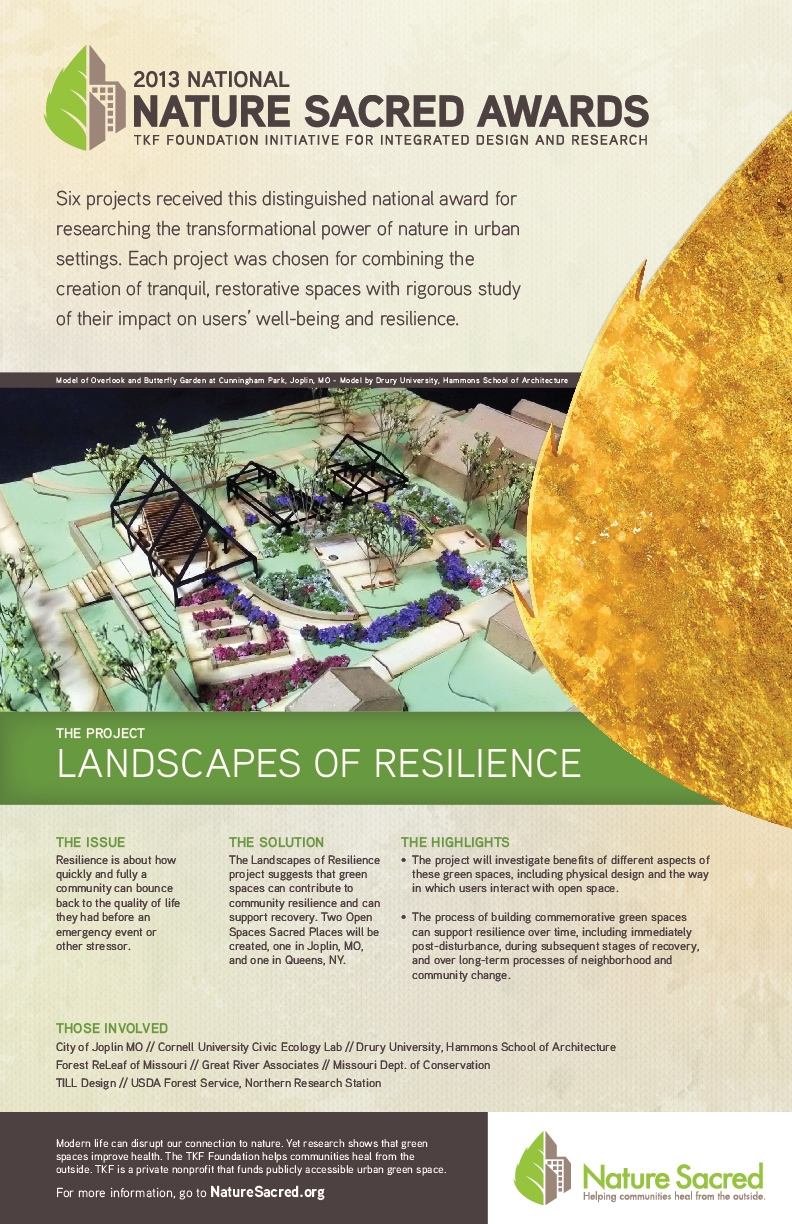Six projects received this distinguished national award for researching the transformational power of nature in urban settings. Each project was chosen for combining the creation of tranquil, restorative spaces with rigorous study of their impact on users’ well-being and resilience. See the full list of projects here. Print version of poster. More Landscapes of Resilience team member interviews: Dr. Erika Svendsen, Nancy Chikaraishi and Traci Sooter.
The television footage of the devastation of Joplin, Missouri — struck by an EF5 multiple-vortex tornado in May 2011 — reminded him of old black and white photos of World War I battlefields scarred deep with trenches. Not just the devastation to the people, but the way the high winds had actually stripped away much of the bark from the trees, laying them bare.
“Those trees were first an indicator of the injury to the ecosystem…and later would become a springboard image as to how the community would respond,” said Keith Tidball, PhD, an Extension Associate and Associate Director of the Cornell University Civic Ecology Lab in upstate New York.
In time that imagery would also help springboard Tidball to the Landscapes of Resilience project in Joplin and Queens, N.Y., which suffered greatly from Hurricane Sandy.
Tidball’s work focuses on the interactions between people and nature, specifically how the environment can influence and strengthen restoration activity in places of crisis — in other words, help people bounce back from natural and manmade catastrophes.
Along with Erika Svendsen, PhD, a Research Social Scientist with the U.S. Forest Service in New York, N.Y., Tidball was researching how nature can be a source of resilience for communities when he first heard of a Request for Proposal from the TKF Foundation. Svendsen’s work dealt with living memorials after the terrorist attacks of Sept. 11, 2001. They quickly realized the RFP was ideal for their work. A military veteran, Tidball has long been interested in restoring the natural environments of areas struck by disaster — whether natural or man-made. He calls it “Greening in the Red Zone,” which is also the title of his upcoming book.
The initial idea was that they pair research from a community hit hard and fast by disaster — as happened that late afternoon on a Spring day in Missouri — with that from a “slow” burn crisis that doesn’t get the same sort of attention, said Tidball.
When the RFP for larger funding from the TKF Foundation’s National Nature Sacred Awards became available, researchers focused in on Joplin and Queens. While both were the sites of natural catastrophes, the types of stressors and the timescales of each made them distinct: Joplin was a rapid, single-day event; Hurricane Sandy left Queens and much of the Atlantic coast not only broken and flooded, but worried of the long-term vulnerability of coastal communities.
The Landscapes of Resilience team will study how new open space, sacred places can contribute to community resilience while supporting recovery from an array of major crises — human, natural, technological and even political. Cunningham Park in Joplin will include a significant expansion to an original tribute. Tidball said they are still waiting on “final final” approval for the Sandy site in Queens, though he already has people on the ground collecting data. Most likely the site will combine memorial restoration with the identification of a single site that most demonstrates TKF’s characteristics of an open space, sacred place.
However the final site is built — whether with open green spaces, communal pavilions, places of quiet reflection and remembrance — they will reflect the lessons he’s been learning and executing since he first started to travel the world to disasters sites and former warzones. Tidball said while he was consistently inspired by the people who wanted to restore those fractured relationships with nature, he was equally disturbed by how often those in power ignored this very real human need.
“I started to see how these relationships with people are really important — and unfortunately often overlooked in the policy worlds.”
In Joplin and Queens, at least, that won’t be the case.

